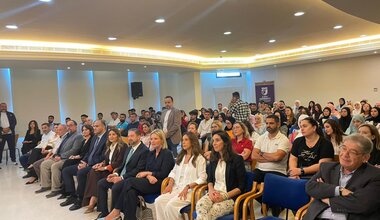UN Humanitarian Chief Concludes Visit to Syria, Lebanon and Turkey
UN HUMANITARIAN CHIEF CONCLUDES VISIT TO SYRIA, LEBANON AND TURKEY
4 September 2021: The Under-Secretary-General for Humanitarian Affairs and Emergency Relief Coordinator, Martin Griffiths, has concluded his seven-day visit to Syria, Lebanon and Turkey yesterday, his first official mission in the region since he assumed his functions.
The humanitarian chief landed in Damascus via UNHAS flight, where he held constructive meetings with senior government officials, diplomats and the humanitarian community, including NGOs, the Syrian Arab Red Crescent, and the International Committee of the Red Cross/International Federation of Red Cross and Red Crescent Societies.
During his meetings with the Syrian Foreign Minister and Deputy Foreign Minister, Mr. Griffiths emphasised the need to expand humanitarian access, protect civilians and help Syrians envision a future for themselves. His visit coincided with the first humanitarian cross-line operation into north-west Syria since 2017, which he welcomed as an important step to reaching more people in need with critical assistance.
Mr. Griffiths then travelled to Aleppo, where he visited a number of projects supported by the Syria Humanitarian Fund (SHF). He spoke with Syrian women, men and children about the profound effects of more than ten years of conflict. As Syria’s economic decline continues to drive and compound already staggering levels of impoverishment, Mr. Griffiths heard from civilians and humanitarian staff about the urgent need to support communities who are determined to restart their lives, yet desperately need early recovery support to do so.
“I met people in Aleppo whose lives had been totally upended by Syria’s long-running crisis,” said Mr. Griffiths. “All expressed the desire to feel safe, but in particular they asked for access to basic services: health care, water, electricity and fuel to keep warm in winter. Children want to learn, and young adults want to work. They want support to forge their own dignified path to a better future.”
In Beirut, Mr. Griffiths met with donors to discuss Syria, and he engaged with the Deputy Prime Minister and the Humanitarian Country Team on the fast-growing needs in Lebanon. Of the issues discussed, Mr. Griffiths emphasized his particular concern over
Lebanon’s severe fuel crisis, which threatens to jeopardize the availability of health care and safe drinking water.
During his visit, the humanitarian chief announced a US$4 million allocation from the Central Emergency Response Fund (CERF) to support increased fuel supply to ensure essential services can continue operating. This complements a further $6 million allocation from the Lebanon Humanitarian Fund (LHF)to help local health facilities.
On the last leg of his visit, Mr. Griffiths travelled to Turkey. In Ankara, he held constructive meetings with the Turkish Presidential Spokesperson and the Deputy Minister of Foreign Affairs, where he welcomed the generosity of the Turkish people and its Government in welcoming Syrian refugees and facilitating cross-border humanitarian operations. He also met with the diplomatic community and the Turkish Red Crescent.
He then travelled to Hatay, where he visited the humanitarian trans-shipment hub to observe UN cross-border operations into Syria. From its hub on the Turkey-Syria border, the UN dispatches 1,000 trucks a month of food, medicine and other life-saving aid to millions of people cut off by hostilities and in desperate need. He concluded his visit in Gaziantep, where he heard from UN agencies, national and international NGOs, Syrian refugees living in Turkey, and members of the Turkish host community.
“The UN needs to be able to reach people who depend on its aid both from Turkey and from within Syria,” said Mr. Griffiths. “With greater access and expanded funding, the UN could do more to help the rising number of people in need. Humanitarians and donors must keep Syria high on our collective agenda to prevent an entire generation being lost.”
In Syria, 13.4 million people need assistance throughout the country. The UN and its partners have so far received about a quarter – 27 per cent – of all funding required under the 2021 Humanitarian Response Plan for Syria, which seeks $4.2 billion. The $5.8 billion Regional Refugee & Resilience Plan aims to help over 5.5 million Syrian refugees and host communities in Egypt, Iraq, Jordan, Lebanon and Turkey. It is only 19 per cent funded.
In Lebanon, the UN and its partners have developed the 2021-2022 Emergency Response Plan for Lebanon to provide life-saving humanitarian support to 1.1 million of the most vulnerable Lebanese people and migrants affected by the ongoing crisis. The $378.5 million humanitarian plan complements UNRWA programs and the Lebanon Crisis Response Plan for Palestine and Syrian refugees and the communities hosting them.
 UN
UN



